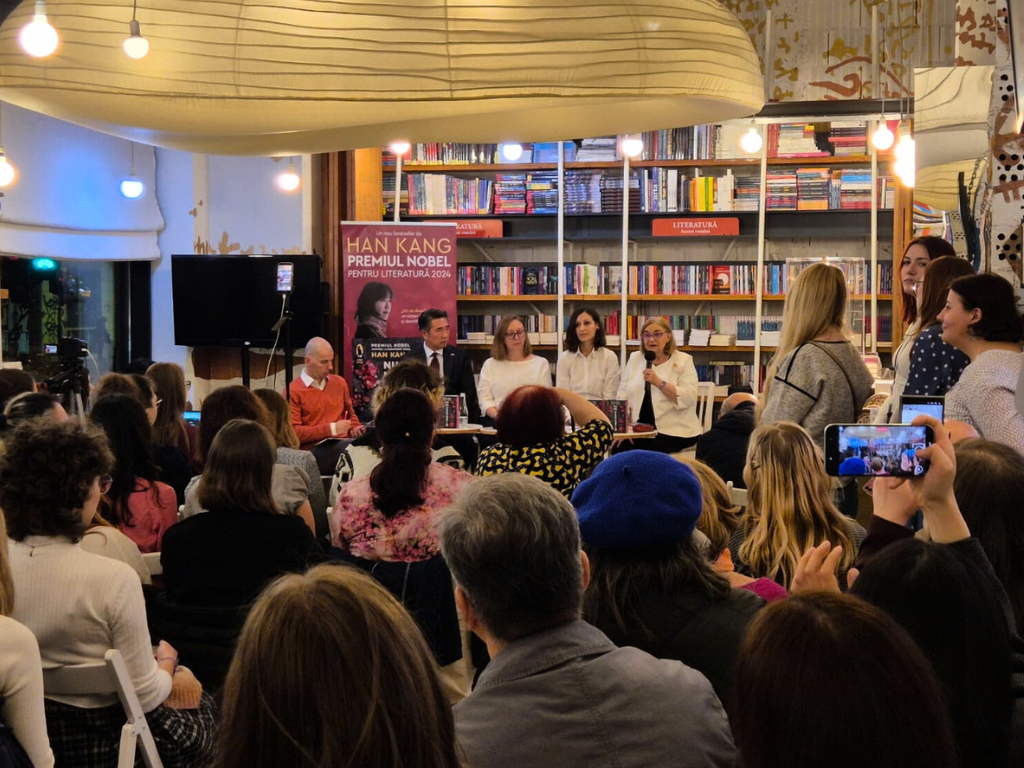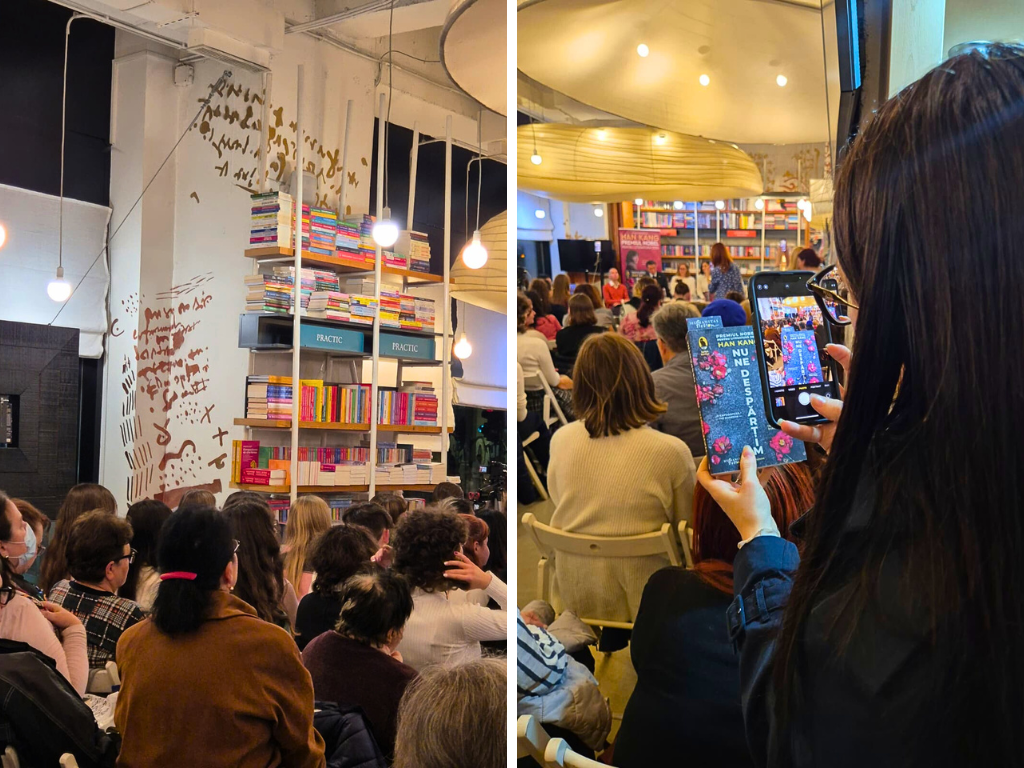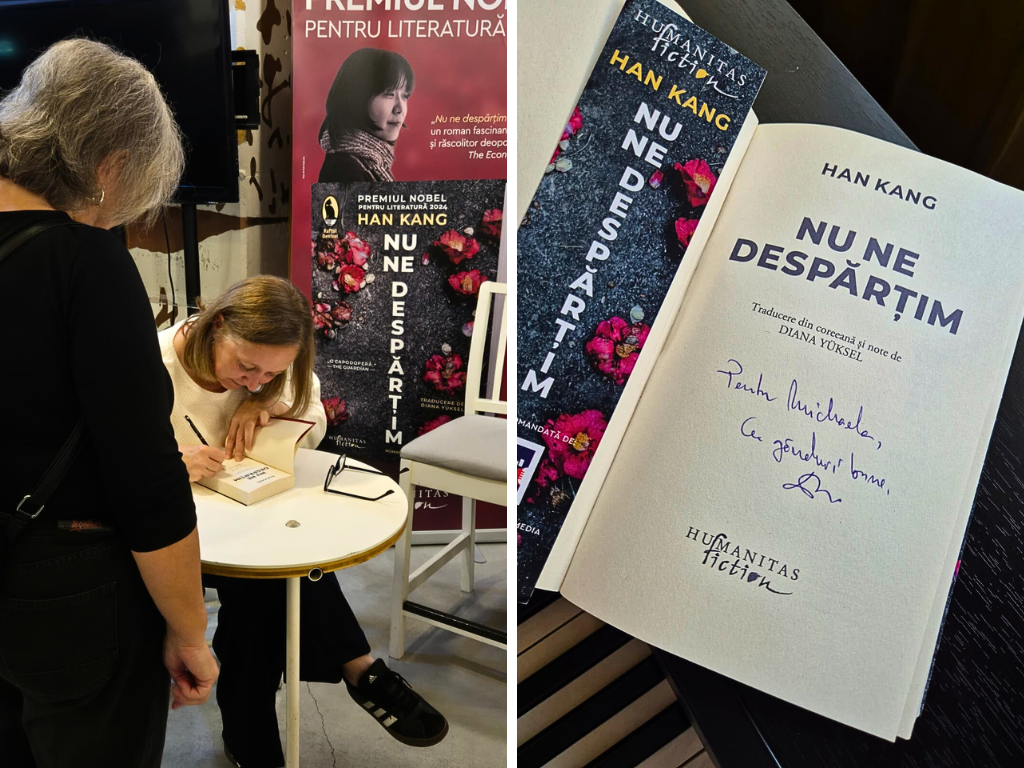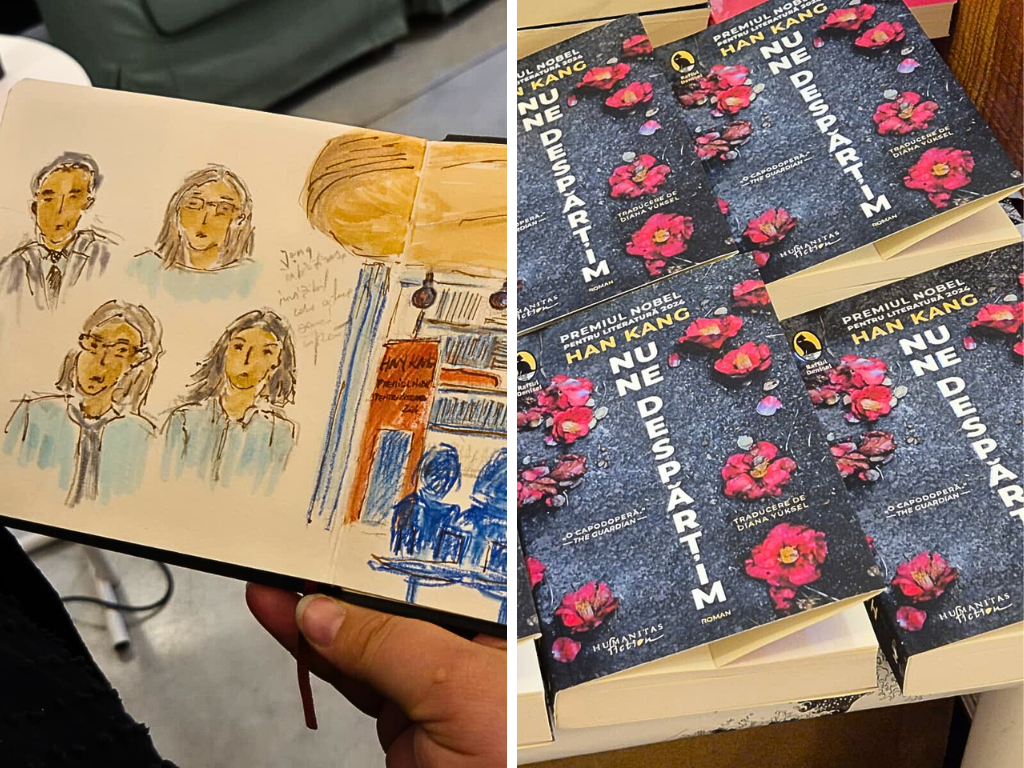When literature becomes diplomacy, the result looks like what happened at Humanitas Cișmigiu on October 29: a full bookstore, a translator bridging continents, and a Nobel-winning author connecting two distant cultures. The launch of Han Kang’s "We Do Not Part" ("Nu ne despărțim") showed how words can deepen the friendship between Romania and Korea through shared emotion and memory. Organized by Humanitas Fiction publishing house, with the support of the Romanian-Korean Studies Center (CSRK), the event celebrated the release of Han Kang’s novel in Romanian, translated by Professor Diana Yüksel, coordinator of the Korean Language and Literature Section at the University of Bucharest.
Moderated by Denisa Comănescu, director of Humanitas Fiction, the discussion gathered distinguished guests: H.E. Rim Kap-soo, Ambassador of the Republic of Korea to Romania; Marius Constantinescu, cultural journalist and writer; and Diana Peca, coordinator of CSRK and professor at the Romanian-American University. Seats were taken long before the event began. Readers stood between shelves, proof that Korean literature has found an audience in Romania — one curious, loyal, and steadily expanding.

In his opening address, Ambassador Rim Kap-soo emphasized that every translation from Korean into another language strengthens cultural understanding. "Literature is one of the most beautiful forms of diplomacy, " he said, congratulating translator Diana Yüksel for her sustained efforts to bring Korean voices closer to Romanian readers. He also noted that 2025 marks two decades since the establishment of Korean Studies at the University of Bucharest, a milestone reflecting the increasing curiosity of Romanian students toward Korea.
Han Kang’s "We Do Not Part", first published in Korea in 2021, revisits the Jeju Uprising (1948–49), one of the most painful episodes in modern Korean history. On an island now known for its beauty, Han Kang evokes the cold of loss, the silence of guilt, and the persistence of memory. Marius Constantinescu called the novel "a winter of the soul and a winter of history" and described the author’s voice as delicate yet merciless. "Few writers can turn coldness into poetry the way Han Kang does, " he said. “It’s a book that leaves you numb, then illuminated. ” The journalist later read aloud one of the book’s most haunting passages, earning a rare moment of silence from the packed audience.

Diana Peca offered the cultural context behind Han Kang’s themes. She spoke about jeong (정), the invisible emotional thread that binds people together, and han (한), the quiet, unresolved sorrow that defines much of Korean art and identity. "These two words explain how Koreans remember, forgive, and stay connected, " she said. “They are also the reason why Han Kang’s stories touch readers everywhere, because they speak to something universal: our shared fragility. ” She compared the Korean and Romanian sensibilities toward history. For Koreans, the past is not something to escape — it’s a compass. For us, it’s often a shadow we prefer not to look at. But events like tonight help us see how memory can heal.
Translator Diana Yüksel described the book as an act of forgiveness — both collective and individual. She explained how translating Han Kang’s prose required not only technical precision but emotional endurance. "The Jeju dialect was one of the hardest parts, " she said. "It’s not standard Korean — it carries centuries of oral tradition. I had to find a Romanian voice that felt local yet unfamiliar, to preserve the island’s isolation."

Yüksel, visibly moved, admitted that certain pages affected her physically: “There were nights when I woke up with my left hand numb. Some stories leave a mark — this one did.” She also revealed that during an international publishers’ meeting, Han Kang’s Korean editor mentioned a new upcoming novel already in preparation, one that will again reach Romanian readers in translation in the near future — a prospect warmly welcomed by the audience.
Born in Gwangju in 1970, Han Kang has become one of the most acclaimed literary voices of her generation. Her International Booker Prize-winning novel "The Vegetarian" (2016) and her later works "Human Acts", "The White Book", and "Greek Lessons" earned her international recognition. In 2024, she was awarded the Nobel Prize in Literature, the first Korean author to receive the honor, praised for her "poetic language and quiet courage in exploring human fragility." Her success reflects a global moment: Korean literature is no longer confined to national boundaries.

Thanks to translators like Diana Yüksel, whose careful Romanian versions capture both rhythm and restraint, these works cross languages while preserving the distinct Korean spirit. The growing number of Korean titles translated worldwide — from Kim Hye-jin to Cho Nam-joo — shows a cultural shift where translation itself becomes an act of recognition and respect.
After the discussion, the evening turned festive. Guests lined up for autographs and explored a calligraphy corner organized by CSRK, where a volunteer wrote participants’ names in Hangul on handmade bookmarks. A tasting of jujube tea and Korean sweets, offered by KJ Center – Korean & Japanese Market, added a note of hospitality to a night centered on remembrance and resilience.

As someone who attended the event, I left with a mix of awe and gratitude. I had read We Do Not Part before that evening, yet hearing it discussed aloud — with the translator’s emotion, the diplomat’s vision, and the scholars’ insight — gave it new meaning. The novel felt less like a story about Korea and more like a mirror for all of us: about memory, silence, forgiveness, and the fragile ways we hold on to love. What moved me most, however, was the sight of people standing in the aisles, listening intently to a conversation about a book written half a world away. It proved that literature can cross languages faster than politics ever could.
The Bucharest launch of We Do Not Part was not only a local literary event but part of a larger story — that of Korean literature’s global journey. Each new translation, whether in Romanian, French, or English, widens the space where readers can meet across histories and experiences. And when those words find a home in another language — as they did that night at Humanitas Cișmigiu — they remind us that, indeed, we do not part.

How about this article?
- Like0
- Support0
- Amazing3
- Sad0
- Curious0
- Insightful1


